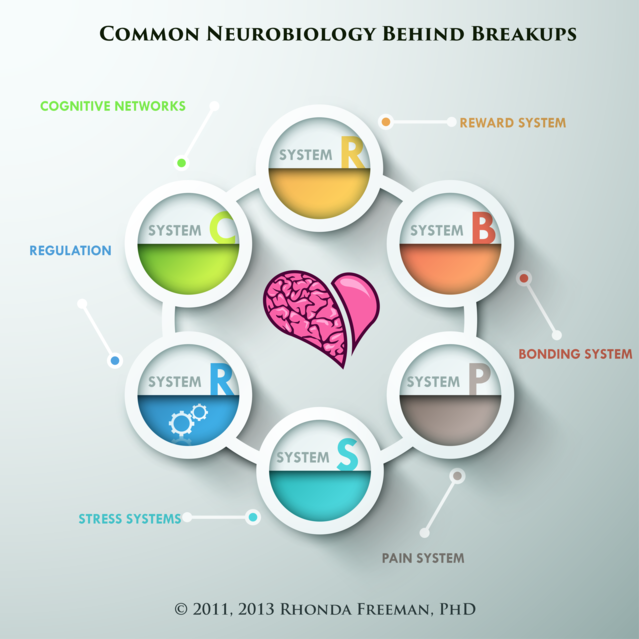
I have always been fascinated by the brain's process of starting and detaching from romantic relationships. It's an
amazing, well-orchestrated interplay of neurochemistry, hormones, and brain system activation and deactivation.
The intense emotions that follow both new love and breakups have an extraordinary impact on our thoughts, mood, and behavior.
There's much truth to the saying, 'love will make you do crazy things!'
The Brain and Breakups
About five years ago I was asked to give a talk regarding neuroscience and breakups to therapists. I love this topic, so I eagerly jumped at the opportunity!In order to share the material in a way that was easily digestible for the audience, I decided to discuss breakups through the framework of brain systems.
Brain systems reflect pathways and brain chemistry that respond in a specific manner under certain conditions. We have numerous systems, and the same brain areas can be a part of many different systems.
Neuroscience Research & Clinical Observations
Based on clinical work with my patients, as well as years of journal reviews it was apparent that there were several systems that are impacted by a breakup.We know that the brain has an intense reaction to the loss of a romantic relationship or social rejection. Researchers who study neuroscience and romantic love (e.g., Fisher, Brown, Aron, Strong, and Mashek, 2010) have identified common ways the brain reacts when we lose a special relationship.
I too have observed these 'symptoms' in patients and added to what we know regarding the neurobiology of breakups, by highlighting a couple of additional brain systems.
Six brain systems can be impacted following a breakup.

Source: © Andrei Krasovitckii/ Envato
- The Bonding System
- Reward System
- Pain Systems
- Stress Systems,
- Emotion-Regulation System
- Cognitive Networks
Let's Get Into What They Do ...
1. Bonding System – The bonding system is all about connection and is primarily run by oxytocin and vasopressin. Immediately following a breakup, this system can go into overdrive to push us back toward our former mate; even if that person was not a kind or loving partner.We might feel alone and like a part of us is missing due to the chemistry of this system.
Consider: Connect with a
warm support system of friends and family. The discussion does not have
to focus on the relationship, but rather simply spend time together.
Hugs, comfort, kind words, and reassurance can be very helpful.
The reward pathways are involved with addiction (to drugs, things, people – anything) and is a part of the bonding system circuitry leading a person to crave their ex-partner.
Serotonin can also impact how a person feels. For example, this neurotransmitter is associated with a person experiencing obsessive thoughts, negativity, and impulsivity.
Consider: It might become necessary to ignore some of the suggestions that this system conjures up. It's seeking 'a fix' (the ex-partner). Some have reported they have felt obsessed and then proceeded to act impulsively and out of character by engaging in repeated calls/texts, stalking, spying, or retaliation against the ex-mate.
If someone wants this system to cool down quicker, they must be careful not to give it what it desires (the ex). Just as one would never find it reasonable to do a little cocaine a few times a week when trying to get sober. The same applies to exes.

Source: © sliper84
Consider: Listening to
music that expresses feelings, especially types that empower, uplift or
relax. (Avoiding themes of despair & loss.) We use music in many
therapeutic approaches in neurology and psychology because it can impact
different regions of the brain. For example, music can affect the deep
subcortical areas (emotion).
Exercise and eat balanced meals to give the brain what it needs to regenerate. Counseling may be necessary.
4. Stress Systems – The primary neurochemistry of these systems are corticotropin releasing hormone and norepinephrine. Two stress
systems tend to reactive immediately following a breakup, leading an
individual to feel hyper-aroused (i.e., alert, awake, ramped up). Some
individuals might experience anxiety, heart palpitations, changes in appetite, and difficulty sleeping.
Consider: Connecting with nature, exercise/ movement
(e.g., a walking), and relaxation strategies like guided imagery can be
soothing. Research has found that each can be helpful, particularly concerning the neurotransmitter serotonin. Serotonin has an inhibitory effect on portions of the stress system (calms it/ can turn it off).
Get to your senses! Engage the senses of smell and hearing. Take advantage of the brain's responsiveness to the environment! Scents and sounds can change our mood and reduce feelings of stress.
But often after a breakup, with this system less engaged, it can be difficult to talk ourselves out of a tough spot or feel balanced.
6. Cognitive Networks - During periods of stress, the brain shifts away from the cognitive (thinking) and regulating system and puts its resources toward the emotional systems. The bottom line is that for many, there will be problems with concentration, organization, and memory.
Conclusion
Through this neurobiological model of breakups, one can see how a person might feel in a decompensated state when a relationship ends. There’s a storm of activity going on in there!Immediately after the separation it is normal for the brain to give a strong reaction to the lost relationship. It might initially attempt to retrieve the ex-partner, but then with time (and efforts toward disengagement) the neurochemistry settles down, and the uncomfortable symptoms fade.
If anyone is experiencing a difficult time coping with the intensity of emotions that follow a breakup, consultation with a mental health profession may be necessary.
For individuals who were in relationships that were traumatizing (e.g., exposure to abuse, a partner with psychopathy or narcissistic personality disorder), the aftermath period is not the same as with a non-abusive partner. Specialized treatment may be required for this (abuse) population.
© 2016 Rhonda Freeman, PhD | All Rights Reserved
Note:Given that people are not all the same and relationship dynamics are different, not everyone will have these reactions. Also, this is a general overview and not reflective of all of the neurochemistry, hormones or brain regions involved.
Adapted from
Freeman, R. (2016). Going Through a Breakup? Get to Know the Neuroscience Behind it. Huffington Post. Contributor.
• Rhonda Freeman, PhD - Neuropsychologist. Exploring the neuroscience of healthy and abusive love relationships.

No comments:
Post a Comment